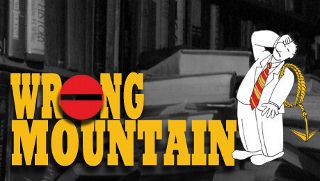WRONG IN MORE WAYS THAN ONE, OR A TREK THROUGH PEDANTRY
Middle-aged misogynist, pedant, and poet Henry Dennett has a chip on his shoulder and a worm in his gut’”literally, a gigantic tapeworm’”but in David Hirson’s astoundingly overwritten play Wrong Mountain, it’s also an overly symbolic worm whose name in Latin means “contempt for one’s own desires.” After publishing a book every year for thirty years, Dennett has had no mainstream recognition and certainly not the monetary compensation that his ex-wife’s new boyfriend’”Broadway playwright Guy Halperin’”boasts.
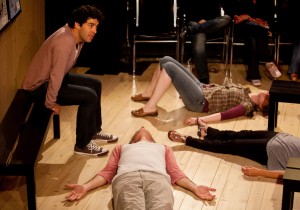 Guy and Henry spend Christmas dinner in a duel of breathless monologues surrounded by Henry’s pretentious and overly loyal children (Henry’s one-dimensional daughter is so enthralled by him that she doesn’t even defend her own child against his cruelty and neglect). With the support of his obsequious son, Henry argues against the theater as anything more than a “biblia pauperum: a bible in pictures for the poor and illiterate”; he asserts that one cannot create art with an audience in mind. Guy humbly suggests that poet, playwright and author all equally, yet differently, climb the treacherous mountain called art with the same fearlessness and faith. Unconvinced, Henry insists that he could easily write a “shit” play and have it produced within six months, proving theater runs on the taste of third-rate minds and not true talent. The bet is made.
Guy and Henry spend Christmas dinner in a duel of breathless monologues surrounded by Henry’s pretentious and overly loyal children (Henry’s one-dimensional daughter is so enthralled by him that she doesn’t even defend her own child against his cruelty and neglect). With the support of his obsequious son, Henry argues against the theater as anything more than a “biblia pauperum: a bible in pictures for the poor and illiterate”; he asserts that one cannot create art with an audience in mind. Guy humbly suggests that poet, playwright and author all equally, yet differently, climb the treacherous mountain called art with the same fearlessness and faith. Unconvinced, Henry insists that he could easily write a “shit” play and have it produced within six months, proving theater runs on the taste of third-rate minds and not true talent. The bet is made.
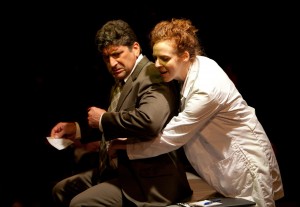 Here’s where things get tricky. Great, the main character’s goal has been set; now the audience will invest their time and sympathy into his journey of success or failure. But guess what? We don’t like Henry, so it’s really hard to care.
Here’s where things get tricky. Great, the main character’s goal has been set; now the audience will invest their time and sympathy into his journey of success or failure. But guess what? We don’t like Henry, so it’s really hard to care.
Henry arrives at Lithia Spring for a Shakespeare festival that may stage his play if he wins the new playwrights competition. He greets the actors and playwrights with the same impatient arrogance he doles out to everyone else. Enter Mr. Maurice Montesor (Douglas Vickers); Vickers, the only reason to see this play, is charismatic and delightful as this caricature of an aging flamboyant theater director who has yet to let go of youthful dreams.
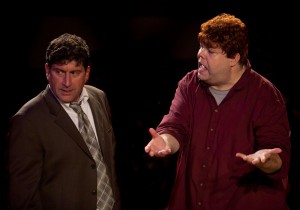 Upon seeing his play performed, Henry immediately sheds his former prejudices against the theater, a move that was bound to happen sometime; but the expedience of his transformation seems both jarring and absolutely implausible. Sure, we see both the instability of Henry’s identity and how quickly one might change in the face of “success,” but what about Henry’s play? We actually never hear a word of it. What in it changed him so forcefully? If plays hold the “truth of the artist” (as one of Henry’s competitors has opined), Wrong Mountain writer David Hirson missed this opportunity to elucidate Henry’s character.
Upon seeing his play performed, Henry immediately sheds his former prejudices against the theater, a move that was bound to happen sometime; but the expedience of his transformation seems both jarring and absolutely implausible. Sure, we see both the instability of Henry’s identity and how quickly one might change in the face of “success,” but what about Henry’s play? We actually never hear a word of it. What in it changed him so forcefully? If plays hold the “truth of the artist” (as one of Henry’s competitors has opined), Wrong Mountain writer David Hirson missed this opportunity to elucidate Henry’s character.
At this point in the play, Hirson begins to ask whether success should define our identities. This question intrigues me immensely, but Hirson should have focused the entire play on unraveling and remolding Henry’s identity slowly around this theme; instead, he wastes an entire first act on an unpersuasive argument: what theatregoer would even begin to consider that theater might not be an art form?
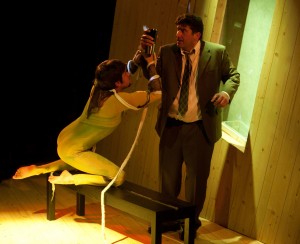 In the beginning, Henry explains that the failure of writing is imprecision, but his assertion later becomes ironic as the circuitous, repetitive, and predictable nature of Hirson’s script unfolds. Every conversational turn could be cut in half’”which means the play lasts torturously twice as long as it should.
In the beginning, Henry explains that the failure of writing is imprecision, but his assertion later becomes ironic as the circuitous, repetitive, and predictable nature of Hirson’s script unfolds. Every conversational turn could be cut in half’”which means the play lasts torturously twice as long as it should.
Equally frustrating is the candy-coated, simplistic humor, which practically offends: After Henry accuses playwrights of pandering to “third-rate minds,” Hirson thinly veils both his defensive rant and tired philosophy with cheap laughs, as if the audience were children and a spoonful of saccharine could make the medicine go down.
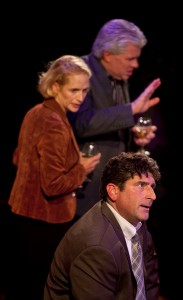 Does Hirson not trust the audience to understand subtlety? Or does he not trust himself to adequately convey his message without bashing people over the head? Too much chatter leaves no room for character’”and no room for the germs of Hirson’s universal truths about art to sprout. Ultimately, it seems that Hirson is more invested in showing off his linguistic prowess than in storytelling. Wrong Mountain is a missed opportunity that drowns in a spring of pedantry, stale humor and tired arguments.
Does Hirson not trust the audience to understand subtlety? Or does he not trust himself to adequately convey his message without bashing people over the head? Too much chatter leaves no room for character’”and no room for the germs of Hirson’s universal truths about art to sprout. Ultimately, it seems that Hirson is more invested in showing off his linguistic prowess than in storytelling. Wrong Mountain is a missed opportunity that drowns in a spring of pedantry, stale humor and tired arguments.
=========================
photos by Anthony Robert La Penna
Wrong Mountain
Rare Terra Theatre at The Second Stage in Chicago
scheduled to end on (Oct. 14, 2012)
for tickets, visit Brown Paper Tickets
for info on this and other Chicago Theater, visit http://www.TheatreinChicago.com
